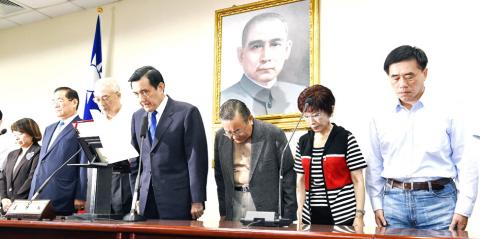President Ma Ying-jeou (馬英九) has reportedly decided to resign as chairman of the Chinese Nationalist Party (KMT) to take responsibility for the party’s crushing defeat in the nine-in-one elections on Saturday, but the news had not been confirmed by KMT spokesperson Charles Chen (陳以信) as of press time.
The news that Ma would make a “big announcement” at a meeting of the party’s Central Standing Committee on Wednesday to resign as chairman emerged on various media outlets almost simultaneously yesterday morning.
Chen said he was not able to confirm the reports, but added that Ma had explicitly told the party that he would never cling to the chairmanship and would take responsibility for the election results.

Photo: George Tsorng, Taipei Times
The KMT won in six of the nation’s 22 cities and counties, losing control of historical strongholds it held in Taipei, Greater Taichung and Taoyuan to the Democratic Progressive Party. It previously controlled 15 seats.
On Saturday, Ma approved the resignations of Premier Jiang Yi-huah (江宜樺) and KMT Secretary-General Tseng Tung-chuan (曾永權).
Taipei Mayor Hau Lung-bin (郝龍斌) said yesterday morning that he offered to resign as KMT vice chairman on Saturday night.
Hau said the election results are a warning from voters to the KMT, calling on the party to examine the message conveyed by the losses and strive to listen more attentively to what people have to say.
Hau said on Facebook that as an incumbent mayor who was responsible for campaigning for KMT Taipei mayoral candidate Sean Lien (連勝文), he takes responsibility for the loss in the capital.
If Ma resigns, Vice President Wu Den-yih (吳敦義), one of the KMT’s eight vice chairs, reportedly would take up the position temporarily until an election is held in three months to select a new chairperson.
Wu said he believes Ma has been deliberating whether he should step down as chairman, adding that to remain in the role would be more difficult than to resign because it was like “burning the candle at both ends.”
Defeated Greater Taichung Mayor Jason Hu (胡志強) said he would continue to serve the party as a vice chairman, although he had considered resigning when he learned of Hau’s decision.
In an interview with China Television, Hu said he would rather work with the party in this time of difficulty than resign.
The reason the KMT lost the election is because it did not understand the younger generation, Hu said.
“Young people take for granted what they are given and they think they are owed what they long for. If you give them an iPhone 5, they are still mad at you because you did not give them an iPhone 6,” he said.

CHAOS: Iranians took to the streets playing celebratory music after reports of Khamenei’s death on Saturday, while mourners also gathered in Tehran yesterday Iranian Supreme Leader Ayatollah Ali Khamenei was killed in a major attack on Iran launched by Israel and the US, throwing the future of the Islamic republic into doubt and raising the risk of regional instability. Iranian state television and the state-run IRNA news agency announced the 86-year-old’s death early yesterday. US President Donald Trump said it gave Iranians their “greatest chance” to “take back” their country. The announcements came after a joint US and Israeli aerial bombardment that targeted Iranian military and governmental sites. Trump said the “heavy and pinpoint bombing” would continue through the week or as long

TRUST: The KMT said it respected the US’ timing and considerations, and hoped it would continue to honor its commitments to helping Taiwan bolster its defenses and deterrence US President Donald Trump is delaying a multibillion-dollar arms sale to Taiwan to ensure his visit to Beijing is successful, a New York Times report said. The weapons sales package has stalled in the US Department of State, the report said, citing US officials it did not identify. The White House has told agencies not to push forward ahead of Trump’s meeting with Chinese President Xi Jinping (習近平), it said. The two last month held a phone call to discuss trade and geopolitical flashpoints ahead of the summit. Xi raised the Taiwan issue and urged the US to handle arms sales to

BIG SPENDERS: Foreign investors bought the most Taiwan equities since 2005, signaling confidence that an AI boom would continue to benefit chipmakers Taiwan Semiconductor Manufacturing Co’s (TSMC, 台積電) market capitalization swelled to US$2 trillion for the first time following a 4.25 percent rally in its American depositary receipts (ADR) overnight, putting the world’s biggest contract chipmaker sixth on the list of the world’s biggest companies by market capitalization, just behind Amazon.com Inc. The site CompaniesMarketcap.com ranked TSMC ahead of Saudi Aramco and Meta Platforms Inc. The Taiwanese company’s ADRs on Tuesday surged to US$385.75 on the New York Stock Exchange, as strong demand for artificial intelligence (AI) applications led to chip supply constraints and boost revenue growth to record-breaking levels. Each TSMC ADR represents

State-run CPC Corp, Taiwan (CPC, 台灣中油) yesterday said that it had confirmed on Saturday night with its liquefied natural gas (LNG) and crude oil suppliers that shipments are proceeding as scheduled and that domestic supplies remain unaffected. The CPC yesterday announced the gasoline and diesel prices will rise by NT$0.2 and NT$0.4 per liter, respectively, starting Monday, citing Middle East tensions and blizzards in the eastern United States. CPC also iterated it has been reducing the proportion of crude oil imports from the Middle East and diversifying its supply sources in the past few years in response to geopolitical risks, expanding